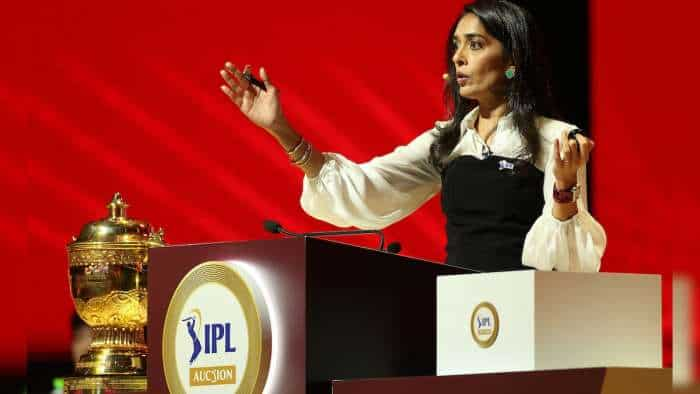Dalal Street Voice: When interest rates increase high PE stocks tend to come down: Rushab Sheth of Karma Capital Advisors
Sheth is the Director and Cofounder of Karma Capital Advisors. Rushabh’s experience spans over 29 years with 21 years in money management – primarily in listed equities. At Karma Capital, he is also Portfolio Manager besides contributing to the overall corporate management

Rushab Sheth, Co-CIO, Karma Capital Advisors said that historically, when interest rates increase, high PE stocks have come down and we may witness the same once again and there will be a rotation to value stocks.
Sheth is the Director and co-founder of Karma Capital Advisors. Rushabh’s experience spans over 29 years with 21 years in money management – primarily in listed equities. At Karma Capital, he is also Portfolio Manager besides contributing to the overall corporate management.
In an interview with Zeebiz's Kshitij Anand, Sheth said that there is near-term volatility due to the geopolitical environment, oil prices, inflation, but, for the long-term investor, this period of volatility and consolidation is a great opportunity. Edited Excerpts –
Q) Geopolitical events as well as expectations of strong tightening by the US Fed, have certainly fueled a risk-off sentiment. What is your take and how should long-term investors view this?
A) The budget was progressive and has given a big thrust to infrastructure – which is one of the most important areas for economic growth.
Also, the budget has not disappointed markets because the underlying economy itself is growing and is well poised to continue growing fast.
The outlook for Indian equities has further improved as the economy emerges from the COVID-19 shock. While there are several tailwinds from the very long-term structural growth trends such as a large domestic market, favorable demographics and a maturing equity market in India - there is an increasing likelihood that in the near to medium term, more technology and manufacturing jobs will relocate here from across the region.
We especially see a sort of renaissance of manufacturing in India over the next few years. Post Covid, there has been a rethink of global supply chains to a “China+1” strategy, increasing costs for Chinese manufacturers due to environmental factors and US-China trade tensions.
Also, the manufacturing sector is less than 13% of GDP and at its lowest since 1960. This offers the Indian manufacturing sector a large opportunity, which, with the right policy environment – like Production Linked Incentive (PLI) schemes - can lead to share of the manufacturing sector in the Indian economy improving.
In the meantime, there is near-term volatility due to the geopolitical environment, oil prices, inflation. But, for the long-term investor, this period of volatility and consolidation is a great opportunity.
Q) What is your take on the December quarter earnings and what are the kinds of projections you foresee for FY23?
A) The earnings in the December quarter were compressed due to higher raw material and inflationary pressures and this will continue for one more quarter.
Consensus Bloomberg EPS estimate for FY 23 for the Nifty companies stands at Rs 888 (an EPS growth of nearly 20% from the previous FYs consensus estimates) and we expect earnings revival to continue.
The April – June quarter will especially look good optically on a year-on-year basis due to the COVID impacted quarter in the previous year.
Q) Last two months have been volatile. How have you positioned your portfolio to tackle volatility amid external headwinds?
A) We have positively positioned our portfolio for inflation and volatility. For instance, media, telecom and pharma - sectors that Karma Capital is overweight on will see an earnings revival, remaining significantly unimpacted by inflation.
Q) Inflation might certainly become a pain point for the economy as well as RBI – what trajectory do you foresee for the rate in the next 12 months. How should investors position themselves to tackle the change?
A) RBI will surely be raising rates but not sure by how much. For investors of Karma Capital, we have reduced weights in financials as we expect financials to be under pressure if rates are hiked more than expectations.
Q) Small & midcaps have clearly outperformed in the past 2 years with handsome margins – how should investors view the space in FY23?
A) Small and mid-caps will remain more volatile. However, with the earnings momentum continuing to build, SMID companies will outperform the market in the next few years.
Within the SMID caps space, there are several types of companies across the spectrum that we find interesting. `
For instance, the rise in income levels will benefit many consumers' discretionary products and services such as passenger vehicles, high-end electronics, etc.
Or the recent financialisation of the economy is surely going to spur unprecedented growth in financial services companies that target under-served markets using a combination of offline and technology-enabled interventions.
Further, there are many niche businesses in manufacturing and services who lead their respective industries with innovation, and tap new growth opportunities like exports, etc.
And not to mention the healthcare, wellness, and clean environment companies that could also benefit post pandemic since there is renewed focus among individuals and family on health and wellness.
Q) If someone is running a portfolio with deep red – what should be his/her strategy before the financial year-end. Hold positions or exit stocks. If exit, then which stocks/fund should the investors exit from?
A) This question needs to be looked at from the 2 points of view. Firstly, if an investor thinks that the stock or mutual fund that they are holding is intrinsically good, hold on, despite this short-term volatility.
However, if it is not meeting the criteria of quality then one should exit - irrespective of market conditions.
And secondly, every investor should have an asset allocation plan that has been developed with the help of an advisor and the investor should continue to stick to that.
Q) FIIs clearly remain net sellers but retail investor force is something that is keeping market float at every support. How do you see FII activity in the near future? There is a saying that when FIIs exit – it is usually the best time to book profits?
A) Due to the recent sell-off, one tends to forget that FIIs have been net buyers for the last decade and that is very unlikely to change. Besides, some of the recent FII sell-off also has been due to selloffs in index funds that invest in emerging markets.
Q) The recent selling was largely seen in high PE stocks while low PE stocks did not see much sell-off. Can we say that smart money is now moving out of high beta counters and richly priced stocks?
A) Historically, when interest rates increase, high PE stocks have come down and we may witness the same once again and there will be a rotation to value stocks.
This scenario is very conducive for stock picking identifying opportunities through a bottom-up, fundamental research process that Karma Capital manages.
Q) Govt. has notified the first phase of the green hydrogen policy. What does it mean for markets and which companies are likely to get benefited the most? Also, does that mean that companies with high ESG ratings will be considered for investment by foreign funds?
A) It’s good to see that the government is taking a step in the right direction. However, it’s too early to see which companies are likely to benefit the most from this step. In general, we feel that ESG will become a big factor in investing as global investors seem to be uncompromising in this area. Indian companies are recognizing this and are working to get their ESG ratings up too.
(Disclaimer: The views/suggestions/advices expressed here in this article is solely by investment experts. Zee Business suggests its readers to consult with their investment advisers before making any financial decision.)
Get Latest Business News, Stock Market Updates and Videos; Check your tax outgo through Income Tax Calculator and save money through our Personal Finance coverage. Check Business Breaking News Live on Zee Business Twitter and Facebook. Subscribe on YouTube.
RECOMMENDED STORIES

IPL Auction 2025 Free Live Streaming: When and where to watch Indian Premier League 2025 mega auction live online, on TV, Mobile Apps, and Laptop?

SIP vs PPF: How much corpus you can build in 15 years by investing Rs 1.5 lakh per year? Understand through calculations

SBI Senior Citizen Latest FD Rates: What senior citizens can get on Rs 7 lakh, Rs 14 lakh, and Rs 21 lakh investments in Amrit Vrishti, 1-, 3-, and 5-year fixed deposits
01:35 PM IST








 Midday Market Update: Nifty, Sensex slump 500 points; 5th consecutive day of losses
Midday Market Update: Nifty, Sensex slump 500 points; 5th consecutive day of losses Final Trade: Final Trade: Sensex sinks 821 pts, Nifty at 5-month low as weak earnings batter investor sentiment
Final Trade: Final Trade: Sensex sinks 821 pts, Nifty at 5-month low as weak earnings batter investor sentiment Midday Market Update: Sensex jumps 436 points, Nifty gains 129 points as auto, IT stocks rally
Midday Market Update: Sensex jumps 436 points, Nifty gains 129 points as auto, IT stocks rally Final Trade: Sensex down 55 pts in volatile trade; Nifty falls below 24,150 as LIC, Tata Motors dive 2% each
Final Trade: Sensex down 55 pts in volatile trade; Nifty falls below 24,150 as LIC, Tata Motors dive 2% each First Trade: Sensex slides 400+ points; Nifty slips below 24,150; Lupin, Emami in focus
First Trade: Sensex slides 400+ points; Nifty slips below 24,150; Lupin, Emami in focus